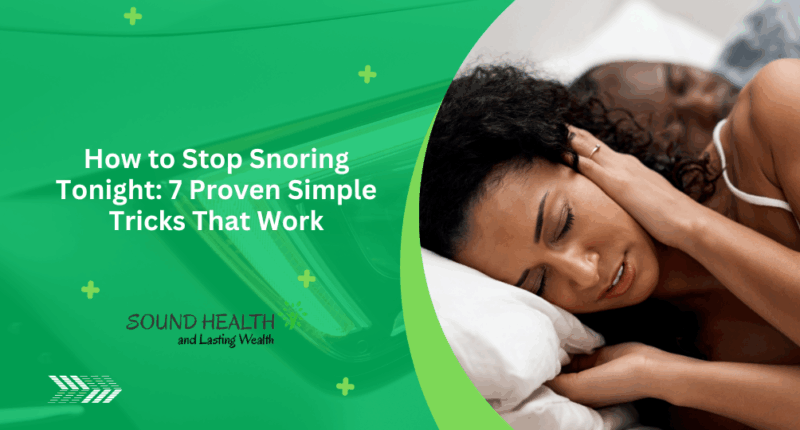Snoring is more than just a noisy nuisance—it can affect the quality of your sleep and that of those around you. If you find yourself waking up with a dry mouth, feeling tired during the day, or receiving complaints from a partner, snoring might be the culprit. Fortunately, effective remedies exist that you can try tonight to reduce or eliminate snoring. This article reveals reliable, expert-backed methods to help you breathe easier and rest better—starting now.

What Causes Snoring? Understanding the Common Culprits
Snoring occurs when airflow through your mouth and nose is obstructed during sleep, causing the tissues in your throat to vibrate and produce the familiar, often disruptive, sound. While many are aware that factors like nasal congestion or relaxed throat muscles can contribute, the underlying causes are often more complex and varied than they seem.
Snoring can happen for a variety of reasons that differ from one individual to another. Some reasons are related to natural aging, while others stem from lifestyle choices or underlying health issues. Recognizing these causes helps in choosing the most effective strategies to reduce or prevent snoring.
Common culprits include:
Aging: As you age, muscle tone decreases throughout your body, including in your upper airway. This muscle loss causes the airway to become narrower, increasing the likelihood of obstruction during sleep. Studies reveal that nearly 40 percent of adults over 60 snore regularly, highlighting how age-related changes directly impact airway patency.
Your sleep position: Sleeping on your back allows gravity to cause the tongue and soft tissues in your upper airway to fall backward, blocking airflow. Dr. Rohrscheib notes that this position significantly increases snoring risks, as it encourages tissue collapse and airway narrowing.
Alcohol consumption: Drinking alcohol relaxes the muscles in your throat and upper airway, making them more prone to collapse during sleep. Additionally, alcohol deepens sleep, which can amplify snoring sounds and duration.
Nasal congestion: Blocked nasal passages from colds, allergies, or sinus problems force you to breathe through your mouth, increasing vibrations of throat tissues and raising snoring likelihood.
Overweight and obesity: Excess weight adds soft tissue around your neck, constricting the airway. Research indicates that up to 70 percent of individuals with sleep-related breathing issues like sleep apnea are obese, emphasizing the strong link between weight and snoring severity.
Underlying health conditions: Conditions such as sleep apnea, hypothyroidism, enlarged adenoids, or a deviated septum can interfere with normal breathing during sleep. Sleep apnea, in particular, is characterized by repeated pauses in breathing, causing loud snoring and frequent wake-ups. Detecting these underlying issues often requires medical assessment and tailored treatment approaches.
By understanding these diverse factors, you are better equipped to identify the specific reasons behind your snoring. This insight not only guides effective remedies but can also highlight when professional evaluation is necessary for persistent or severe cases.
How Do I Know If I Snore?
Many people are unaware that they snore because it happens during sleep. However, you can identify it by noting signs such as waking up gasping or choking, morning headaches, persistent fatigue, or someone else alerting you to the noise. Using smartphone apps or wearable devices that record sleep sounds can also help determine if snoring occurs. Recognizing the issue is the first step toward effective intervention.
7 Simple Tricks to Stop Snoring Fast and Sleep Peacefully Tonight
Here are practical, actionable methods based on clinical evidence and user experience that you can apply immediately:
1. Sip Chamomile Tea Before Bed
Chamomile tea is known for its calming properties. Drinking a warm cup before bedtime can relax the muscles in your throat, reducing the vibrations that cause snoring. This natural remedy also promotes better sleep quality, which can diminish disturbances related to snoring.
2. Mist With a Sea Spray to Clear Nasal Passages
A sea salt nasal spray helps clear mucus and reduce nasal congestion, which often leads to mouth breathing and snoring. Using the spray before sleep maintains open nasal airways, facilitating smooth breathing. It is especially effective for those with sinus issues or allergies.
3. Try a Nasal Strip to Open Nasal Airways
Nasal strips gently lift and widen the nostrils, increasing airflow through the nose. This simple solution is non-invasive and instantly improves breathing in many users, proven to decrease snoring frequency and intensity.
4. Take Allergy Meds at Night to Reduce Inflammation
Antihistamines or allergy medications help control inflammation and mucus buildup in nasal passages. By alleviating allergy symptoms, these medications address one of the root causes of congestion that triggers snoring.
5. Sing as You Suds: Vocal Exercises to Strengthen Throat Muscles
Singing activates and tones the muscles of the soft palate and throat. Regular vocal exercises can reduce tissue flabbiness that contributes to airway obstruction. Studies suggest that even a few minutes daily can decrease snoring over time.
6. Sleep on Your Side to Keep Airways Open
Sleeping on your back allows the tongue and soft tissues to collapse backward, obstructing airflow. Adopting a side-sleeping position keeps your airways aligned and reduces obstruction. Using a body pillow or specialized wearable devices can encourage this position.
7. Use a Wedge Pillow to Elevate Your Head
Raising your head twelve inches with a wedge pillow leverages gravity to keep airways open, preventing soft tissues from collapsing. This position also reduces nasal congestion and encourages nasal breathing.
Supporting Facts and Anecdotes
Recent sleep studies report that approximately 45% of adults snore occasionally, while 25% experience habitual snoring, making it a widespread problem. One case involves a middle-aged software engineer who eliminated snoring using mainly side-sleeping and nasal strips after years of nightly disruptions reported by his spouse. This improvement not only saved his relationship but also enhanced his daytime alertness and mood.
Conclusion
Snoring should not be ignored, as it can affect overall well-being and quality of life. Implementing even one or several of these seven simple tricks can bring faster relief and restore peaceful sleep for you and those around you. Starting tonight, try these practical solutions to breathe easier and wake up refreshed.
Also Read | Celebs Warn: Why Black Women Face Higher Uterine Fibroid Rates Today










